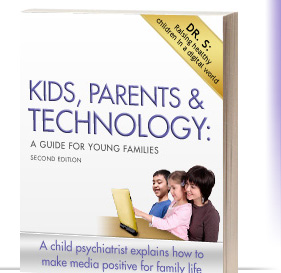3.25.10
Whatever your politics about healthcare, the President and First Lady are right on about this .
President Obama and the First Lady are on the right track when it comes to finding the right balance for their daughters’ media lives, “The girls don’t watch TV during the week. Period.”
While it seems at first glance that the presidential couple’s emphasis is on restrictions and making rules, the real message is actually on the positive: “Very early on, we set expectations for Malia and Sasha in terms of them taking responsibility for their own education.” No TV means doing schoolwork instead. It is schoolwork that will lead the children to lead better lives. And the Obamas can surely model that for their kids, if anyone can. Let us all pay attention.
Recent studies show that the more media permeates a home, the more is family life deteriorating and the less happy are the kids. Good parents are frustrated, but restrictions don’t work and they don’t know what to do.
What works is ongoing commitment to managing kids’ media lives just as we manage nutrition. Parents must plan media consumption as they do diets. A distinguished child psychiatrist’s “KIDS, PARENTS & TECHNOLOGY: A GUIDE FOR YOUNG FAMILIES” gives parents tips to leverage home-court advantage to make media positive family life assets. Fathers, mothers, grandparents, teachers, therapists, pediatricians – use new technologies to enhance families’ health and young children’s development.




Monitoring Kids’ Cellphone Activity
Link to Original Article
3.26.10
Although media are such pervasive aspects of our kids’ lives, parents continue to react in a piecemeal and poorly coordinated manner to this powerful force. It is time to think comprehensively and decide the role of media in your kids’ lives and to form a rational and comprehensive media plan for each child. Monitoring and restricting are usually only partially effective approaches. Parents need to become proactive and plan media consumption as they do food consumption. Otherwise, kids will continue to consume junk media as they do junk food.